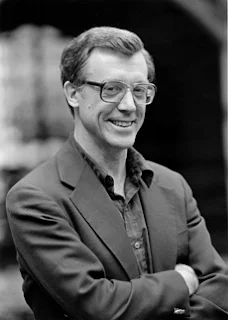David Montgomery was a Farnam Professor of History at
Yale University died from brain hemorrhage he was 84..
[1] Montgomery was considered one of the foremost academics specializing in United States
labor history and wrote extensively on the subject. Along with
David Brody and
Herbert Gutman, he is credited with founding the field of "
new labor history" in the U.S.
[2]
(December 1, 1927 – December 2, 2011)
Biography
Early years
Following a stint in the
U.S. Army Corps of Engineers, from which he was honorably discharged as a
Staff Sergeant, Montgomery entered undergraduate school at
Swarthmore College. He graduated in 1950 with Highest Honors and a
Bachelor of Arts degree in
political science.
Over the next 10 years, Montgomery worked as a
machinist—first in New York City and later in
Saint Paul, Minnesota. It was as a machinist that Montgomery became involved in
union activity as an active member of the
United Electrical Workers, the
International Association of Machinists, and the
Teamsters. He held numerous positions, including
shop steward, legislative committee member, and local executive board member.
It was also at this time, in 1951 or 1952, that Montgomery became a member of the
Communist Party, USA.
The party's positions on international issues, racial justice and
social unionism led Montgomery to join. He was active with the party in
New York City and briefly in St. Paul. He left the party around 1957.
Montgomery's experience in the Communist Party clearly influenced his
research interest in labor radicalism, among other issues, throughout
his scholarly career.
[3] It was while Montgomery was a labor organizer among machinists in
St. Paul, Minnesota that he may have been repeatedly targeted by the FBI.
[4]
Academic career
In 1959, Montgomery entered
graduate school at the
University of Minnesota, from which he received his
Ph.D. in 1962. The next year he was hired as an
assistant professor of history at the
University of Pittsburgh, where he remained for the next 14 years. At the University of Pittsburgh, Montgomery wrote his first book,
Beyond Equality: Labor and the Radical Republicans, 1862-1872,
which was published in 1967. On sabbatical from that institution,
Montgomery spent two years working in England with historian
E. P. Thompson to establish the
Centre for the Study of Social History at the
University of Warwick. He subsequently held visiting teacher positions at
Oxford University and a number of other universities in Brazil, Canada, and the Netherlands.
On his return to the United States, Montgomery returned to the
University of Pittsburgh, becoming chair of the department. He was
recruited by several other institutions, eventually accepting a position
at Yale. Montgomery taught courses about the history of working people
in the United States,
Civil War and
Reconstruction, and immigration. In 1988, his book
The Fall of the House of Labor: The Workplace, the State, and American Labor Activism, 1865-1925, was published to wide acclaim.
Noam Chomsky, the renowned and controversial professor of
linguistics at the
Massachusetts Institute of Technology and political activist, called the book one of the definitive works on the American labor struggle. The book was a
Pulitzer Prize finalist nominee.
Following the example of British historian
E. P. Thompson,
Montgomery encouraged a generation of labor historians to re-examine
the core subject matter of labor history, thus defining the new labor
history, which examines
working-class culture, rather than simply their organizations. He was also influential through his editorship of the journal
International Labor and Working-Class History.
In 2001, Montgomery published a book in collaboration with Professor
Horace Huntley of the
Birmingham Civil Rights Institute. The book,
Black Workers' Struggle for Equality in Birmingham, uses
oral histories to interpret and explore the involvement of
African American workers in various unions and the organized labor movement for
civil rights.
During the 1990s, Montgomery wrote and spoke about
academic freedom,
calling for wider availability of information for research and in favor
of a larger scope of academic freedom. He claimed that over the
presidential administrations of
George W. Bush and
Bill Clinton,
access to government documents had been sharply reduced and that this
has resulted in less academic freedom. Additionally, Montgomery
criticized the USA's
Patriot Act and its provisions for
surveillance of academics and librarians, arguing they impede academic freedom.
[5]
He also served as president of the
Organization of American Historians (OAH) from 1999 to 2000.
[6]
Death and legacy
David Montgomery died on December 2, 2011. He is survived by his
wife, Martel, and two sons, New York attorney Claude Montgomery and
economist
Edward B. Montgomery. An obituary for Montgomery appeared Monday, December 5, 2011 in the
Pittsburgh Post-Gazette.
[7]
In the spring of 2012 the Executive Board of the Organization of
American Historians approved a new book award in the field of Labor and
Working Class History to be named after David Montgomery.
[8] Fundraising was begun to build a $50,000
endowment for the prize, after which time the David Montgomery award is to be presented annually by the OAH in conjunction with the
Labor and Working Class History Association.
[8]
To see more of who died in 2011
click here











